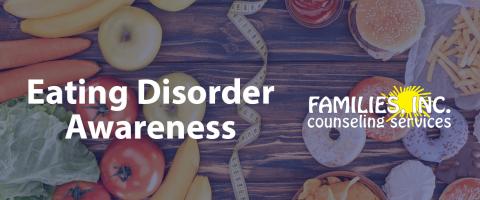
The 3rd week of February, 2/21 – 2/27, is Eating Disorder Awareness Week. We’re taking this time to shine a light on the struggles of those suffering from these difficult conditions. Together, we can minimize the stigmas and find a positive way forward.
About Eating Disorders
The American Psychiatric Association defines eating disorders as “behavioral conditions characterized by severe and persistent disturbance in eating behaviors and associated distressing thoughts and emotions.”
While there are common misconceptions that delegitimize or downplay the severity of eating disorders, they can be very serious conditions. These illnesses can cause great turmoil in nearly every area of one’s life, impairing their ability to function physically, psychologically and socially.
In general, eating disorders pertain to fixations on intake of food, body weight and shape or anxiety that stems from the repercussions of eating. These are not a lifestyle choices, but complex and dangerous conditions that often occur in tandem with other mental disorders (anxiety, obsessive compulsive disorder, alcohol and drug abuse).
Common Eating disorders
- Anorexia Nervosa: condition in which one avoids food, greatly restricts food or eats very small portions of only select types of foods.
This can involve restrictive behavior or binge-purging, where the person eats a large quantity of food in a short time span only to expel it from their bodies through vomiting or use of laxatives.
Symptoms include extreme thinness and the unending pursuit of a thin physique, regardless of one’s weight (due to distorted body image). Many other physical symptoms may manifest, from skin and nail damage to muscle weakness and low blood pressure.
- Bulimia Nervosa: typically involves alternating one’s diet between low calorie ‘healthy’ foods and binge eating unusually large quantities of ‘unhealthy’ foods. This behavior is then followed by purging through vomiting, laxatives, diuretics, excessive exercise and other unhealthy weight loss tactics. It is associated with a sense of loss of control and is often secretive.
Symptoms include a range of gastrointestinal issues, chronic sore throat and other imbalances.
- Binge-eating Disorder: condition where one experiences episodes of extreme loss of control with food intake, consuming unusually large quantities. This is similar to Bulimia Nervosa, but does not involve purging.
Long-term complications include obesity, diabetes, high blood pressure, and heart issues.
- Avoidant Restrictive Food Intake: formerly known as selective eating disorder, this condition involves an individual not meeting nutritional needs due to extremely picky eating.
Symptoms include dramatic weight loss, low appetite, gastrointestinal issues and more.
Treatment
A wholistic approach is necessary for a sustainable recovery from an eating disorder. There’s no one-size-fits-all plan, but it’s important to address several areas of one's life, namely psychological, behavioral, nutritional, and medical considerations.
Denial, reluctance to change eating patterns and anxiety about facing the issues head on are very common. For this reason, seeking professional treatment can be helpful in laying out a positive path forward.
If you or a loved one are experiencing symptoms of an eating disorder or any other forms of mental illness, consider speaking to a therapist or related professional.
Our friendly and compassionate mental health experts at Families, Inc are here to help. Give us a call or visit us at one of our 11 local clinics in Arkansas. Together, we can help you enjoy a healthier, happier life.


